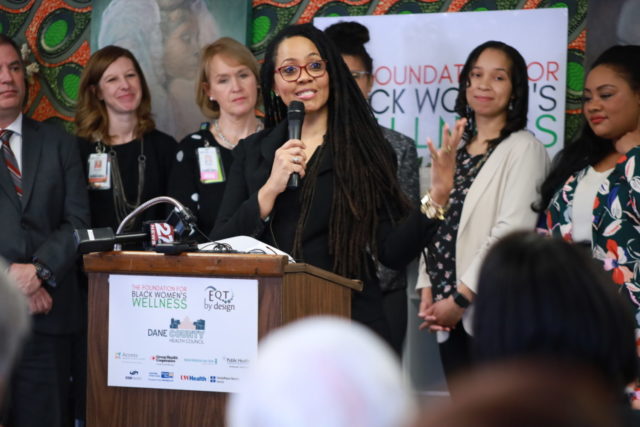A new Black Maternal and Child Health Alliance will coordinate resources to support the health of Black mothers, infants and families.
The Alliance was one of several new or expanded initiatives announced at a press conference at the offices of the Foundation for Black Women’s Wellness Thursday.
“We are excited about the progress of this collective effort as we work towards a Dane County where Black infants are born healthy. The investments we share today are powerful steps in the right direction, and will continue to center around the voices and needs of Black women and their families” said Lisa-Peyton Caire, founding CEO and President of the Foundation for Black Women’s Wellness, in a statement.
The mission of the Black Maternal and Child Health Alliance (BMCHA) is to work to transform birth outcomes in Dane County by identifying, informing and advancing strategies and approaches that improve reproductive, maternal and newborn health of Dane County’s African American population.
A roundtable discussion with the BMCHA and the Dane County Health Council is scheduled for April ,where key stakeholders will identify priorities and goals. The first annual Wisconsin Black Maternal & Child Health Summit is scheduled for 2021.
The BMCHA has also committed up to $25,000 per year to train and hire more doulas to assist in Black maternity and infant care.
“Investments in the expansion in the Black doula system is an imperative in combating racial disparities,” said Tia Murray of Harambe Village, the local organization that trains and coordinates doulas in Dane and Milwaukee Counties.
Babies born to African-American mothers in Dane County are two times more likely than white infants to be born with low birth weights, a fact which puts them at risk of significant health challenges and higher infant-mortality rates, but assitance from a doula can dramatically reduce those disparities.
“Infant health is a true measure of a community, a county, a state. We can do better by investing in doulas as a starting point. We aren’t the whole solution but we are part of the solution,” Murray said. “It will create a ripple effect across the social and ecological spectrum, if done in collaboration with those closest to the issue.”
Peyton-Caire said a primary concern of the Alliance will be outreach — through low-tech means.’
“A big part of our engine is our community-based neighborhood relationships,” she said. “A lot of people ask how we’re able to get Black women to come out to events. That’s not just through technology. It’s through word of mouth, it’s from relationships, through churches, it’s from community centers. Building up that complex web of communication and information dissemination is part of what we’re constructing together, which is new.”
Another new initiative announced Thursday is the Care Coordination project, funded through a $1 million Wisconsin Partnership Program grant. It is a collaboration with Epic Systems to develop a technology system that will identify needs during prenatal appointments and connect families with agencies that can provide resources like stable housing, employment and child care assistance.
Peyton-Caire also announced the hiring of Ariel Robbins to coordinate the project.
Dane County Health Council is a coalition of health care providers, government and non-profits with a mission to eliminate gaps and barriers to optimal health and reduce disparities in health outcomes in Dane County.
Council members include: Access Community Health Centers, Group Health Cooperative of South Central Wisconsin, Madison Metropolitan School District, Public Health Madison & Dane County, SSM Health St. Mary’s Hospital, United Way of Dane County, UnityPoint Health-Meriter, and UW Health.
In 2018, The Foundation for Black Women’s Wellness and EQT by Design led a nine-month long collective community engagement effort in partnership with the Health Council to identify sustainable solutions to low birthweight babies born to African-American mothers in Dane County. They announced their findings in an April 2019 report.


































